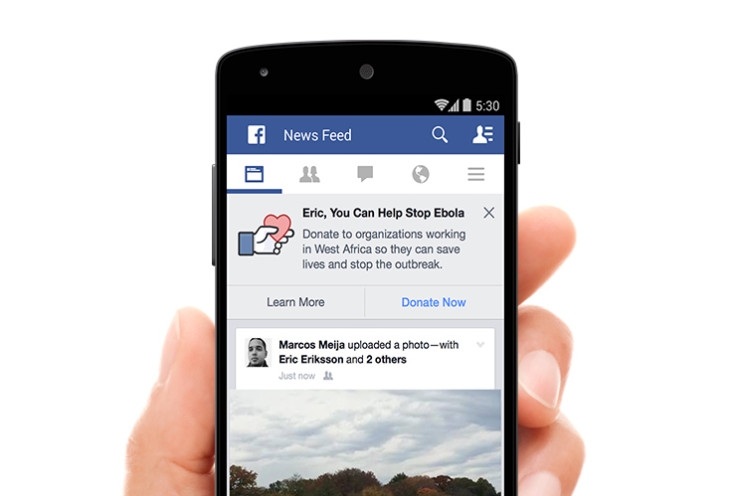Facebook Donate Button: Users Fight Ebola from the News Feed with Charity Money

Over the coming days Facebook users will be given the ability to donate to the fight against Ebola from their News Feed.
The donate button will give the option of giving money to three charities: International Medical Corps; the International Federation of Red Cross and Red Crescent Societies; and Save the Children.
The move comes after the site's owner, Mark Zuckerberg, donated $25m (£15.7m) to help fight the spread of Ebola.
If the button hasn't yet appeared on your News Feed, you can visit facebook.com/fightebola, where donations of between £10 and £100 (or of an amount of your choice) can be pledged and paid for with PayPal, debit- or credit-card.
On its mobile app, Facebook will post a message at the top of the page asking users to donate or learn more. The message can be dismissed with a tap of the 'X' in the top right corner.
Facebook has also collaborated with Unicef to show information on Ebola symptoms and the treatment used in the affected regions of West Africa. The messages will appear in the News Feeds of users living in the affected and neighbouring countries, will be written in their local language, and discuss detection, prevention and treatment for the disease.
Finally, by working with the NetHope consortium of 41 international NGOs, the billion-member social network will donate 100 mobile satellite terminals to provide mobile voice and data services for medical and aid workers in Guinea, Liberia and Sierra Leone.
Providing stable and wide-reaching communications services is vital in treating Ebola effectively, as Facebook explained in a statement: "Response organisations estimate that for each patient, at least 10 other people will provide health care, contact tracing and other services that may require telecommunications — and improvements are most important in rural areas where infrastructure is weakest and case loads are highest."
Facebook warns that, if not addressed, the Ebola epidemic "could become a long-term global health crisis." The social network's immense reach of its 1.3 billion users makes it uniquely able to both inform large chunks of the global population, and receive donations from them.
© Copyright IBTimes 2025. All rights reserved.






















